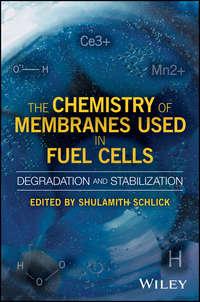The Chemistry of Membranes Used in Fuel Cells

Shulamith Schlick
Genre:foreign educational literature
Language:English
Type:PDF book
Publisher:John Wiley & Sons Limited
Publication date:08.12.2022
Price:$186.96
Views:34
Examines the important topic of fuel cell science by way of combining membrane design, chemical degradation mechanisms, and stabilization strategies This book describes the mechanism of membrane degradation and stabilization, as well as the search for stable membranes that can be used in alkaline fuel cells. Arranged in ten chapters, the book presents detailed studies that can help readers understand the attack and degradation mechanisms of polymer membranes and mitigation strategies. Coverage starts from fundamentals and moves to different fuel cell membrane types and methods to profile and analyze them. The Chemistry of Membranes Used in Fuel Cells: Degradation and Stabilization features chapters on: Fuel Cell Fundamentals: The Evolution of Fuel Cells and their Components; Degradation Mechanism of Perfluorinated Membranes; Ranking the Stability of Perfluorinated Membranes Used in Fuel Cells to Attack by Hydroxyl Radicals; Stabilization Mechanism of Perfluorinated Membranes by Ce(III) and Mn(II); Hydrocarbon Proton Exchange Membranes; Stabilization of Perfluorinated Membranes Using Nanoparticle Additives; Degradation Mechanism in Aquivion Perfluorinated Membranes and Stabilization Strategies; Anion Exchange Membrane Fuel Cells: Synthesis and Stability; In-depth Profiling of Degradation Processes in Nafion Due to Pt Dissolution and Migration into the Membrane; and Quantum Mechanical Calculations of the Degradation Mechanism in Perfluorinated Membranes. Brings together aspects of membrane design, chemical degradation mechanisms and stabilization strategies Emphasizes chemistry of fuel cells, which is underemphasized in other books Includes discussion of fuel cell performance and behavior, analytical profiling methods, and quantum mechanical calculations The Chemistry of Membranes Used in Fuel Cells is an ideal book for polymer scientists, chemists, chemical engineers, electrochemists, material scientists, energy and electrical engineers, and physicists. It is also important for grad students studying advanced polymers and applications.